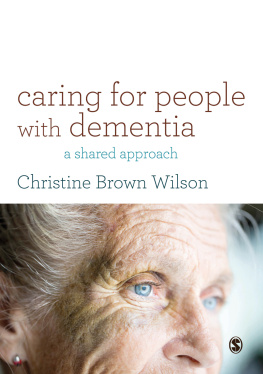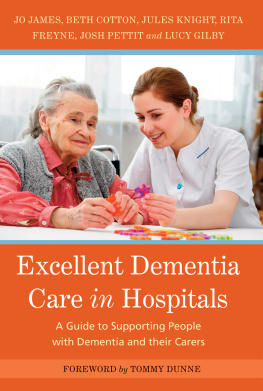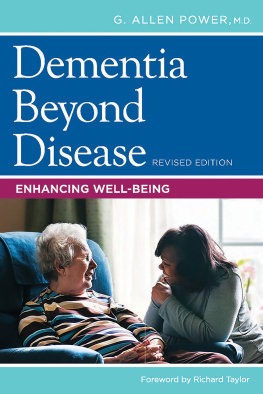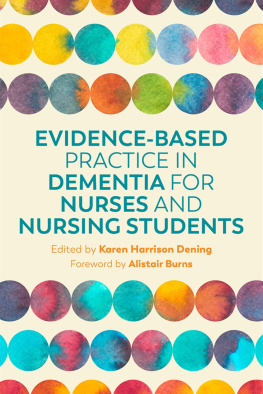Caring for People with Dementia
Caring for People with Dementia
A Shared Approach
SAGE Publications Ltd
1 Olivers Yard
55 City Road
London EC1Y 1SP
SAGE Publications Inc.
2455 Teller Road
Thousand Oaks, California 91320
SAGE Publications India Pvt Ltd
B 1/I 1 Mohan Cooperative Industrial Area
Mathura Road
New Delhi 110 044
SAGE Publications Asia-Pacific Pte Ltd
3 Church Street
#10-04 Samsung Hub
Singapore 049483
Christine Brown Wilson 2017
First published 2017
Apart from any fair dealing for the purposes of research or private study, or criticism or review, as permitted under the Copyright, Designs and Patents Act, 1988, this publication may be reproduced, stored or transmitted in any form, or by any means, only with the prior permission in writing of the publishers, or in the case of reprographic reproduction, in accordance with the terms of licences issued by the Copyright Licensing Agency. Enquiries concerning reproduction outside those terms should be sent to the publishers.
Library of Congress Control Number: 2016954243
British Library Cataloguing in Publication data
A catalogue record for this book is available fromthe British Library
ISBN 978-1-4129-6199-8
ISBN 978-1-4129-6200-1 (pbk)
Editor: Becky Taylor
Assistant editor: Charlne Burin
Production editor: Katie Forsythe
Copyeditor: Jill Birch
Proofreader: Thea Watson
Indexer: Gary Kirby
Marketing manager: Tamara Navaratnam
Cover design: Wendy Scott
Typeset by: C&M Digitals (P) Ltd, Chennai, India
Printed in the UK
About the Author
Christineis an Associate Professor at the University of Queensland, Australia currently holding the position of Director of Teaching and Learning in the School of Nursing, Midwifery and Social Work. Prior to this Christine was a Senior Lecturer at the University of Manchester in the UK, where she worked with a number of organisations interested in improving dementia care. Christines research is interdisciplinary as she works with social workers, psychologists and engineers to consider novel solutions to real world practice problems. Christine adopts a partnership model of research involving people with dementia, family caregivers and staff. Whilst in Manchester, Christine led a Care Homes Research Interest Group that brought together academics, care organisations, healthcare staff, people with dementia, family caregivers and direct care staff to determine the questions that needed to be asked in research proposals.
Christines research focuses on relationship-based approaches to care and how to improve the experience of people with dementia, their families and staff. Since returning to Australia, Christine has been working with indigenous organisations to explore the cultural transferability of relationship-based approaches to care. Christine is also working with family caregivers and people living with dementia in the community to consider how families and communities may provide support and further resources in living well with dementia.
Christine has published widely in academic journals and her first book,
Caring for Older People: A Shared Approach, was published by Sage in 2013 with positive reviews.
Caring for Older People: A Shared Approach explains in depth how to apply relationship-based approaches to care in a range of settings drawing on the perspective of older people, families, staff and students. This book:
Caring For People With Dementia: A Shared Approach, applies the same principles within the context of organisations, demonstrating how we can all make a difference when caring for people with dementia by working together at every level of the organisation.
Foreword
This book is about enabling person-centred and relationship-centred care in practice and highlights the importance of culture in advancing this perspective. Dr Brown Wilson calls this perspective relationship-based approaches to care. An important message she shares in the introduction of the text is: To achieve the best care possible, we need to prepare nurses and other health care practitioners with the skills and attitudes to provide effective culturally responsive care. As a dementia researcher and health professional I am very supportive of this statement and I would like to promote this book as one way to help readers and students to prepare for the practice of evidence-based care of people with dementia. Dr Brown Wilsons message encouraged me to reflect on several situations in my teaching, research and family where relationship-based approaches to care were espoused but often not connected within practice. I share some of these reflections below in the hope that they demonstrate the importance of culture and relationship-based approaches to care.
Some years ago when I was teaching a postgraduate class about dementia I was confronted half way through the semester by a small group of students from a culture outside of Australia. These students argued with me that they didnt know why I was teaching subjects such as person-centred care, relationship-centred care and non-pharmacological approaches to care as these practices went against what was accepted and current practice in their country. For example, in their culture if a person with dementia was agitated or aggressive the family or health professional would manage the person and situation by giving them psychotropic medication and tying the person to a chair or locking them in a room. They argued that this resulted in the problem being contained: there was no longer a problem for staff or family of an agitated or aggressive person, and this was acceptable in their practice. I felt the floor opening up to me as I realised my teaching was representing an Australian culture of care and I had neglected to allow students the opportunity to examine their beliefs and practices in relation to evidence-based relationship approaches to care. This was a perfect opportunity for me to reflect on my teaching practice and to consider alternative ways to assist students from any culture to discuss and to understand why some practices even though they are common are not best for the individual. I hope readers of this text will also be open to practices that may be new to them and to take note of the approaches outlined by Dr Brown Wilson in this text.
A few years ago when asking staff from a residential aged care facility to tell me about their philosophy of care they all quickly expressed that the philosophy of care in their organisation was person-centred care (PCC). However, not one of these staff could tell me what they did in their practice to advance PCC. They knew the words but they didnt know how to play out such a philosophy within the care situation, as PCC was not incorporated or truly embraced within their organisation. Unfortunately even today I continue to see similar examples where PCC sits in broad statements within an organisational mission statement but is not truly practised. This text will help readers to understand the importance of culture and the impact of culture on care provision.


















